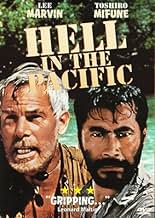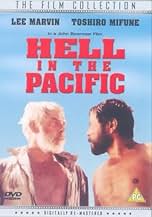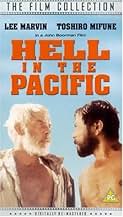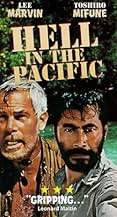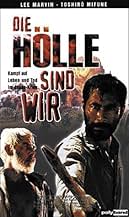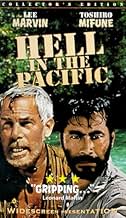PUNTUACIÓN EN IMDb
7,2/10
9,5 mil
TU PUNTUACIÓN
Durante la Segunda Guerra Mundial, un piloto Americano y un capitán de la armada Japonesa se encuentran en una pequeña isla del Océano Pacífico. Ahí, deben poner fin a su hostilidad y cooper... Leer todoDurante la Segunda Guerra Mundial, un piloto Americano y un capitán de la armada Japonesa se encuentran en una pequeña isla del Océano Pacífico. Ahí, deben poner fin a su hostilidad y cooperar si quieren sobrevivir, pero ¿lo harán?Durante la Segunda Guerra Mundial, un piloto Americano y un capitán de la armada Japonesa se encuentran en una pequeña isla del Océano Pacífico. Ahí, deben poner fin a su hostilidad y cooperar si quieren sobrevivir, pero ¿lo harán?
- Dirección
- Guión
- Reparto principal
- Premios
- 1 premio y 2 nominaciones en total
Toshirô Mifune
- Captain Tsuruhiko Kuroda
- (as Toshiro Mifune)
Reseñas destacadas
A Japanese naval officer and an American pilot find themselves stranded alone on a desert island during WWII. How would you react to being marooned with a dangerous enemy? This film is an obscure treasure that should be better known. I suspect that people are put off by the cheesy and unsuitable title. The film explores the evolving relationship of two men from different cultures as they each struggle to find the best way to survive. Their collective fate is an exploration of the human condition.
One outstanding feature of this film is that it is in both Japanese and English, intentionally without sub-titles. An American or Japanese audience could watch this film and appreciate its message. This duality serves to heighten the cultural differences between the two men, and it is cultural bias that is the true enemy.
Buy it, it's a keeper!
One outstanding feature of this film is that it is in both Japanese and English, intentionally without sub-titles. An American or Japanese audience could watch this film and appreciate its message. This duality serves to heighten the cultural differences between the two men, and it is cultural bias that is the true enemy.
Buy it, it's a keeper!
Isolation in extreme conditions allows for very telling studies of human beings, and potentially unpleasant philosophical conclusions. Marooning a character on an island will get you some dramatic results, and the only way to take it a step further is to maroon that character's worst possible enemy with him. That's what Hell in The Pacific proposes.
This is not Cast Away Meets WWII. For one thing, it has a much tighter focus, completely losing anything beyond the island's horizon. It is admirable in its bloody-minded focus, and, with only two actors to cast, it's hard to imagine how it could have been any more perfect that pitching wild-man extraordinaire Lee Marvin opposite Kurosawa favorite Toshiro Mifune. A genius idea, but one that could have failed with a more conventional approach.
We are introduced to both antagonists in a neutral way, free to prefer which ever one we choose, though that is hardly the point, and director John Boorman makes it both easy and at times hard to sympathise with either in equal measure. Both actors do a fine job, playing mostly emotional and physical roles with great restrain and intelligence.
Boorman's direction is perfect, rejecting excess stylization in favor of a subtle approach, aided by superb photography. You have got to see this at least once, simply because, for all its visceral thrills, it is quite profound without ever trying to be. Because it boasts top performances from two of the last century's greatest leading presences in action cinema. Because, though frustrating at first, the ending is, for once, the smartest one that could have been chosen. Humanity is on trial and the judges choose to be honest and pragmatic, thus delivering something that combines greatness and very thoughtful substance.
We need more films like this!
This is not Cast Away Meets WWII. For one thing, it has a much tighter focus, completely losing anything beyond the island's horizon. It is admirable in its bloody-minded focus, and, with only two actors to cast, it's hard to imagine how it could have been any more perfect that pitching wild-man extraordinaire Lee Marvin opposite Kurosawa favorite Toshiro Mifune. A genius idea, but one that could have failed with a more conventional approach.
We are introduced to both antagonists in a neutral way, free to prefer which ever one we choose, though that is hardly the point, and director John Boorman makes it both easy and at times hard to sympathise with either in equal measure. Both actors do a fine job, playing mostly emotional and physical roles with great restrain and intelligence.
Boorman's direction is perfect, rejecting excess stylization in favor of a subtle approach, aided by superb photography. You have got to see this at least once, simply because, for all its visceral thrills, it is quite profound without ever trying to be. Because it boasts top performances from two of the last century's greatest leading presences in action cinema. Because, though frustrating at first, the ending is, for once, the smartest one that could have been chosen. Humanity is on trial and the judges choose to be honest and pragmatic, thus delivering something that combines greatness and very thoughtful substance.
We need more films like this!
Not only is this film a fascinating account of survival against odds, its a reflection of cultural differences within a crucial historical timeframe. Its narrative may be flawed, a little too stylized, but it features two of the greatest faces of 60s cinema history: Marvin and Mifune. Looking back on the second world war, it seems ironic that the Japanese believed their culture was superior in warfare, and the Americans believed theirs was superior for peace. In the end it will turn out to be the other way around. This film touches on that subject, highlighting Marvins aggressive, loud, and brutal behavior, and Mifunes quieter, more methodical survival methods. But in their battle to survive, the two men become almost indistinguishable. The most touching scene in the film: Both men collapsed in their sinking raft, dejected, exhausted, dehydrated, totally at their mercy of nature, a symbolic scene for human life. The DVD i saw contained both endings, the original, never seen in TV prints, much more believable and satisfying.
What I would give to know only Japanese and watch this movie. You don't have to understand what Toshiro Mifune is saying to understand this movie.
Does war extend to the individual? Trained to kill or be killed, two adversaries face off. Each with his own fear that the other will succeed. Why didn't they kill each other when they had the chance? Because man is a social animal and he needs the company of others. To use a cliché - No man is an island.
And in the end conflict erupts. Not because of any innate difference between the two men - but because of how they define themselves in a greater scene. I am Japanese - you are American (and vice versa). Throw in the element of non-communication (neither spoke any of the other's language) and you have it.
Two great actors, a great script, a grand theme.
Does war extend to the individual? Trained to kill or be killed, two adversaries face off. Each with his own fear that the other will succeed. Why didn't they kill each other when they had the chance? Because man is a social animal and he needs the company of others. To use a cliché - No man is an island.
And in the end conflict erupts. Not because of any innate difference between the two men - but because of how they define themselves in a greater scene. I am Japanese - you are American (and vice versa). Throw in the element of non-communication (neither spoke any of the other's language) and you have it.
Two great actors, a great script, a grand theme.
Anti-war movies have come in many shapes and sizes – from the shocking to the satirical, from the blunt to the oblique – but few are as simply effective as Hell in the Pacific. At turns suspenseful, mysterious, cartoonishly funny and touchingly human, it boils the conflict down to the adventures of two men on opposite sides forced to share an island, but rather than just being a trite allegory, it convincingly demonstrates the benefits of co-operation over competitiveness, and shows that mistrust and enmity are not necessarily innate.
Ignoring the ridiculously abrupt ending, Hell in the Pacific is excellent in its structure. Considering that the target audience is going to be English-speaking (although the experience would not be too diminished for a Japanese audience) the story is told in the beginning from the perspective of the Japanese man. The American character is a mere presence amid the trees, and the fact that we can understand him is of little consequence because he doesn't say much of relevance. The Toshiro Mifune character is more loquacious, even though most viewers won't know what he's saying, and Lee Marvin's relative quietness emphasises the wordless savagery of the first half. It's only as the picture progresses and the men become more amiable towards each that they become recognisably human characters. But even this is done more through imagery than words, giving us an equally good impression of the two of them despite the language barrier.
This telling from the Japanese point-of-view is also reinforced in the methods of director John Boorman, who often makes the camera Mifune's eyes or keeps him up front while Marvin lurks in the background. Other than that, Boorman's style as a director is like a love letter to Akira Kurosawa and Sergio Leone, the latter especially. He gives us gnarly close-ups, a dynamic rhythm and eye-catching tableaux such as the shot of Marvin and Mifune as they arrive on the second island, like statues about to leap into action. It is all very overtly stylised, but it is a pretty neat way of keeping this story of such simple elements constantly interesting and engaging.
Toshiro Mifune is well-known to even the most casual of foreign cinema buffs, being the favourite star of the aforementioned Kurosawa. It's nice to see him used well in this less familiar context. The only other non-Japanese picture I have seen him in is a bizarre British-made Western called Red Sun, which is incidentally one of the worst films I have ever seen. You notice, seeing him here opposite Lee Marvin, he is not a tall man, but he makes up for this with his strong presence and irascible energy. But it's not all about the rage. I like here his passively bemused responses when Marvin is ranting at him. Lee Marvin shows his easy capacity for turning a serious-sounding performance into something surprisingly comical, such as his acting out of throwing the stick and picking it up.
Appropriately for a movie of few words, music plays a big part in Hell in the Pacific. The Lalo Schifrin score is by turns haunting, playful, and sometimes teasingly melodramatic. It is an unusually big score for a movie that is otherwise so minimalist, but its constant variation and inventiveness suits the action very well. And, aside from the power of its message, this is part of what makes Hell in the Pacific so appealing. It is all of a piece, a mesmerising tone poem on a the fate of humanity.
Ignoring the ridiculously abrupt ending, Hell in the Pacific is excellent in its structure. Considering that the target audience is going to be English-speaking (although the experience would not be too diminished for a Japanese audience) the story is told in the beginning from the perspective of the Japanese man. The American character is a mere presence amid the trees, and the fact that we can understand him is of little consequence because he doesn't say much of relevance. The Toshiro Mifune character is more loquacious, even though most viewers won't know what he's saying, and Lee Marvin's relative quietness emphasises the wordless savagery of the first half. It's only as the picture progresses and the men become more amiable towards each that they become recognisably human characters. But even this is done more through imagery than words, giving us an equally good impression of the two of them despite the language barrier.
This telling from the Japanese point-of-view is also reinforced in the methods of director John Boorman, who often makes the camera Mifune's eyes or keeps him up front while Marvin lurks in the background. Other than that, Boorman's style as a director is like a love letter to Akira Kurosawa and Sergio Leone, the latter especially. He gives us gnarly close-ups, a dynamic rhythm and eye-catching tableaux such as the shot of Marvin and Mifune as they arrive on the second island, like statues about to leap into action. It is all very overtly stylised, but it is a pretty neat way of keeping this story of such simple elements constantly interesting and engaging.
Toshiro Mifune is well-known to even the most casual of foreign cinema buffs, being the favourite star of the aforementioned Kurosawa. It's nice to see him used well in this less familiar context. The only other non-Japanese picture I have seen him in is a bizarre British-made Western called Red Sun, which is incidentally one of the worst films I have ever seen. You notice, seeing him here opposite Lee Marvin, he is not a tall man, but he makes up for this with his strong presence and irascible energy. But it's not all about the rage. I like here his passively bemused responses when Marvin is ranting at him. Lee Marvin shows his easy capacity for turning a serious-sounding performance into something surprisingly comical, such as his acting out of throwing the stick and picking it up.
Appropriately for a movie of few words, music plays a big part in Hell in the Pacific. The Lalo Schifrin score is by turns haunting, playful, and sometimes teasingly melodramatic. It is an unusually big score for a movie that is otherwise so minimalist, but its constant variation and inventiveness suits the action very well. And, aside from the power of its message, this is part of what makes Hell in the Pacific so appealing. It is all of a piece, a mesmerising tone poem on a the fate of humanity.
¿Sabías que...?
- CuriosidadesBoth Lee Marvin and Toshirô Mifune actually served in the Pacific during World War II, of course on opposing sides. Marvin was a US Marine. He was wounded during the war and received the Purple Heart during the Battle of Saipan in 1944. Mifune served in the Imperial Japanese Army Air Service.
- PifiasLee Marvin was 44 at the time of filming, as evident by his gray hair. Toshiro Mifune's character also calls him an "old man" several times. WWII US Navy pilots Thus, he looks much too old for an actual WWII US Navy pilot, who were mostly in their twenties or early thirties.
- Citas
American Pilot: Oh, for a second I thought you were a Jap.
- Versiones alternativasAmerican version featured an alternative ending where the two get drunk and walk off in separate directions arguing at each other; in the British version (which was exactly the same as the Japanese version), they start yelling and a bomb from the sky falls and blows everything apart.
- ConexionesFeatured in Hollywood Remembers Lee Marvin (2000)
Selecciones populares
Inicia sesión para calificar y añadir a tu lista para recibir recomendaciones personalizadas
- How long is Hell in the Pacific?Con tecnología de Alexa
Detalles
- Fecha de lanzamiento
- País de origen
- Idiomas
- Títulos en diferentes países
- Hell in the Pacific
- Localizaciones del rodaje
- Empresas productoras
- Ver más compañías en los créditos en IMDbPro
Taquilla
- Presupuesto
- 4.150.000 US$ (estimación)
- Duración
- 1h 43min(103 min)
- Relación de aspecto
- 2.35 : 1
Contribuir a esta página
Sugerir un cambio o añadir el contenido que falta


